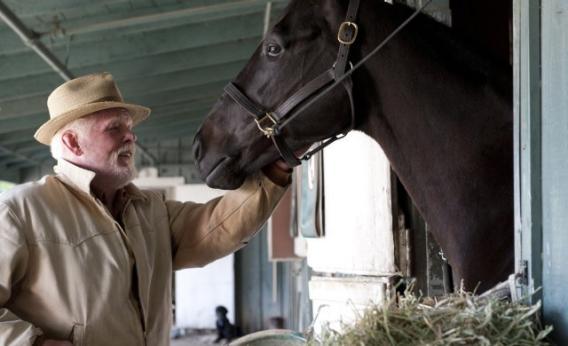After a third horse died during filming of its second season, HBO announced the sudden and unexpected cancellation of Luck last night. In a statement HBO explained the reasons behind the cancellation:
Safety is always of paramount concern. We maintained the highest safety standards throughout production, higher in fact than any protocols existing in horseracing anywhere with many fewer incidents than occur in racing or than befall horses normally in barns at night or pastures. While we maintained the highest safety standards possible, accidents unfortunately happen, and it is impossible to guarantee they won’t in the future. Accordingly, we have reached this difficult decision.
Luck wasn’t exactly leading the pack in ratings, but the announcement came only a day after the death of the third horse (she was being taken back to her stall when she “reared, flipped over backward and struck her head on the ground“); it is widely assumed that the events were directly related.
What’s less clear is why Luck’s horses are garnering this response. What makes the suffering of animals in the service of making television so much worse than the suffering of animals in the service of making steak or scrambled eggs? As TIME television critic James Poniewozik writes, “I eat too many hamburgers to pass judgment on Luck,” adding, “I can’t take the moral high ground—again, too many burgers—but logical or not, there’s just something more discomfiting about knowing that horses died so we can watch them in the comfort of our living rooms.”
I too found it discomfiting to watch the show knowing that horses had died during filming—but I also admired how the show didn’t flinch from that uneasiness. Horses are repeatedly shown suffering on the show, reflecting the realities around the race track. One horse has to be euthanized in the very first episode, after fracturing its leg during a race, just as happened during filming for that same episode.
And maybe it’s a good thing that Luck made us uneasy. While I am obviously glad that the American Humane Association protects animals on set (they provide the “no animals were harmed” certification), the first thing to pass through my head after hearing news of Luck’s cancellation was the Onion headline “Many Animals Harmed In Catering of Film.” Yes, we make a distinction between animals that suffer for our nourishment and animals that suffer for our entertainment. But when we can get plenty of nutrition without making animals suffer, the justification for that distinction seems unclear.
As Slate explained back in October, America has shied away from eating horse meat since around the time of World War II, even while horses are commonly eaten in Europe and many other countries abroad. Clearly we have a particular fondness for horses, which, in the U.S., embody a popular myth of the Old West, and most of us regard as graceful and noble animals. But does that fondness justify treating them differently than we treat so many other animals?
I’ve eaten plenty of animals in my life, and contribute to their suffering on a more or less daily basis; I’m certainly not excusing myself from the moral murkiness of this situation. But I’m not sure the cancellation of Luck actually represents progress in our treatment of animals. Are people bothered by the suffering of animals on the set of Luck—or did they just not want to watch it?
